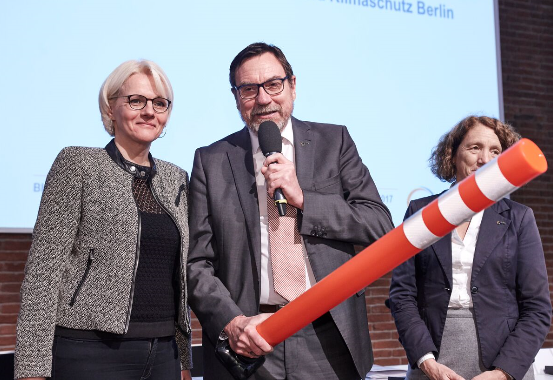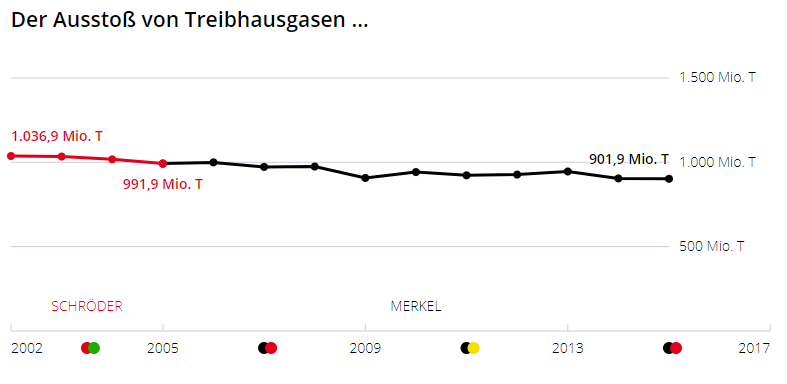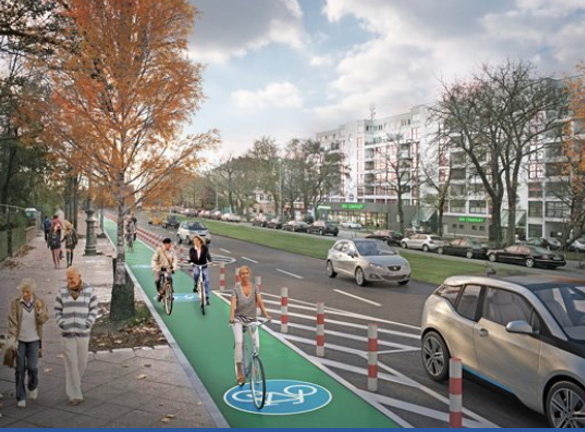
Why Germany needs the mobility transition, and not just other types of cars
While German parties are still struggling to form a new coalition government, ECF’s German member, ADFC, strongly calls for a mobility transition. Germany has to overcome its car-centric transport policy and give a strong push to cycling, walking and public transport if it wants to honour its Paris Climate Agreement obligations.
Due to the climate talks at COP23 in Bonn, the focus in public, media and scientific community has strongly moved at how the technical host of this conference, Germany, is actually performing in reducing CO2 emissions. The short answer is: Not good.
Germany has set the target of reducing greenhouse gas (GHG) emissions by 55 % by 2030, compared to 1990. By the end of 2015, a 28 % emission reduction has been achieved. [1] Little flattering for acting Chancellor Merkel: when she entered office in 2005, the counter already stood at 21 %. In fact, Germany’s CO2 emissions have been pretty much flat for the past nine years [2] [See Graph: Der Ausstoss von Treibhausgasen/ Greenhouse Gas Emissions]

It is the transport sector where the gap between claim and reality is particular wide: While the aim is to achieve a 41 % emission reduction in transport by 2030, the counter stood at a mere 2 % reduction in 2014 [3]. In this context, the lobby success of the German automotive industry to water down the new 2030-CO2 emission targets for cars and vans proposed last week by the European Commission, in hindsight, might turn out as a Pyrrhic victory as these targets will achieve only one third of the emission reductions needed in the transport sector [ECF reported]. The big question is: Where will the remaining two third come from if Germany and by extension the whole EU want to honour their climate change obligations they committed to in the Paris Agreement?
Against this background, attempts to form a new German government have failed for the time being. However, ECF’s German member, ADFC, reminds German politics that business as usual will not be good enough:
„E-cars are expected to save the climate and the cities, but they won’t do so as long as ever more trips are done by car. The quality of life in cities is strongly negatively impacted by car traffic. Future cities need attractive alternatives which motivate people to cycle more often, use public transport or walk. We miss this vision in all potential coalition parties“, says Ludger Koopmann, ADFC Board member.
Specifically, the ADFC calls for following action points from the next federal government:
- Increase federal investments for bicycle infrastructure from € 130 million today to € 800 millon annually;
- Support cycle highways in a holistic manner; give them priority over expanding motorways in highly urbanised centres;
- Provide dedicated funding for municipalities to develop cycling;
- Introduce „Vision Zero“ (Zero fatalities in road traffic) as a principal objective in the highway code;
- Implement the Paris Climate Change Agreement also in the transport sector.
 At its Annual General Meeting, ADFC also expressed its strong support for a Mobility Law in Berlin that could serve as a blueprint for many other cities or states. That proposed law should be adopted as soon as possible. In its latest draft version, it calls for physically separated bike lanes on all principal roads in Berlin. The law would be a novelty for Germany and sign of a new era for cycling mobility across the country, ADFC hopes.
At its Annual General Meeting, ADFC also expressed its strong support for a Mobility Law in Berlin that could serve as a blueprint for many other cities or states. That proposed law should be adopted as soon as possible. In its latest draft version, it calls for physically separated bike lanes on all principal roads in Berlin. The law would be a novelty for Germany and sign of a new era for cycling mobility across the country, ADFC hopes.
Speaking at the AGM, the Berlin Transport Minister Regine Günther said that more and better bike lanes are a precondition to a successful mobility transition. „We want that Berlin will be an example for convenient cycling mobility“, she said. In a symbolic act, ADFC President Ulrich Syberg handed the Berlin Transport Minister a bollard, referring to the concept of protected bike lanes that will be introduced now across the city.
Sources:
[1] Umweltbundesamt: http://www.umweltbundesamt.de/daten/klima/treibhausgas-emissionen-in-deutschland#textpart-1
[2] Graph: Der Ausstoss von Treinhausgasen .../ Greenhouse Gas Emissions http://web.br.de/interaktiv/merkel-nach-zahlen/
[3] KfW: Deutschland – Land der Autofahrer: Wie steht die Bevölkerung zur Verkehrswende? https://www.kfw.de/PDF/Download-Center/Konzernthemen/Research/PDF-Dokumente-Fokus-Volkswirtschaft/Fokus-2017/Fokus-Nr.-187-November-2017-Verkehrsbefragung.pdf
Contact the author
Recent news!
Upcoming events
Contact Us
Avenue des Arts, 7-8
Postal address: Rue de la Charité, 22
1210 Brussels, Belgium









